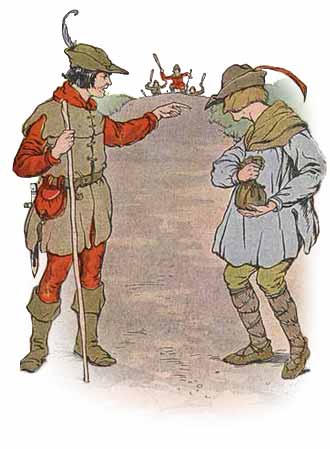The Travelers and the Purse 旅人和钱包 (精美插图) 双语 拼音注音 伊索寓言
标签:伊索寓言 儿童故事集 中英对照翻译 双语故事 拼音注音
Last Update 最后更新: 2022-01-12

The Travelers and the Purse (English)
Total Words: 170
Two men were traveling in company along the road when one of them picked up a well-filled purse.
"How lucky I am!" he said. "I have found a purse. Judging by its weight it must be full of gold."
"Do not say 'I have found a purse,'" said his companion. "Say rather 'we have found a purse' and 'how lucky we are.' Travelers ought to share alike the fortunes or misfortunes of the road."
"No, no," replied the other angrily. "I found it and I am going to keep it."
Just then they heard a shout of "Stop, thief!" and looking around, saw a mob of people armed with clubs coming down the road.
The man who had found the purse fell into a panic.
"We are lost if they find the purse on us," he cried.
"No, no," replied the other, "You would not say 'we' before, so now stick to your 'I'. Say 'I am lost.'"
Moral: We cannot expect any one to share our misfortunes unless we are willing to share our good fortune also.
旅人和钱包 (中文翻译 拼音注音)
从前有两个旅人结伴而行,其中一人偶然在路上捡到了一个沈甸甸的钱包。
“我真是太走运了!”他说。“我找到了一个钱包。这个钱包那么沉,一定是装满了金子。”
“你不应该说‘我找到了一个钱包’,”他的伙伴说。“你应该说‘我们找到了一个钱包’和‘我们真走运’。因为旅伴应该有福同享有难同当。”
“不,不,”那个人生气地说道。“钱包是我找到的,就应该属于我。”
正在这时,他们听见有人大喊“小偷,你给我站住!”。他们环顾四周,看见有一群愤怒的人们拿着棍棒,沿路走来。
找到钱包的那个人一下子慌了神。
“要是他们发现钱包在我们身上,我们就遭殃了。”
“不,不,”另一个人回答道,“你找到钱包的时候没有说‘我们’,现在也不应该说‘我们’。你应该说‘我要遭殃了’。”
Relevant Fables 相关寓言故事
- 伊索寓言:The Plane Tree 梧桐树
- 伊索寓言:The Cock and the Jewel 公鸡和宝石
- 伊索寓言:The Goose and the Golden Egg 鹅和金蛋
- 伊索寓言:The Spendthrift and the Swallow 败家子和燕子
About 关于
The Aesop Fables for Children 伊索寓言儿童故事全集 (图文英汉双语版) (this work), the english fables originally from The Aesop for Children: with Pictures by Milo Winter published by Rand, McNally & Co in 1919. Some of pictures come from Library of Congress. This work is considered to be in the public domain in the United States. The Aesop Fables for Children contains the text of selected fables, color pictures, video, and interactive animations, and will be enjoyed by readers of any age.
The Aesop Fables for Children are a collection of stories designed to teach moral lessons credited to Aesop, a Greek slave and story-teller thought to have lived between 620 and 560 BCE.
Aesop's fables are some of the most well known in the world and have been translated in multiple languages and become popular in dozens of cultures through the course of five centuries. They have been told and retold in a variety of media, from oral tradition to written storybooks to stage, film and animated cartoon versions—even in architecture. This page include translation to Simplified Chinese.
伊索寓言是一部世界上最早的寓言故事集,是世界文学史上流传最广的寓言故事之一。 本文包含伊索寓言故事英文原文和简体中文翻译(中英双语)。




